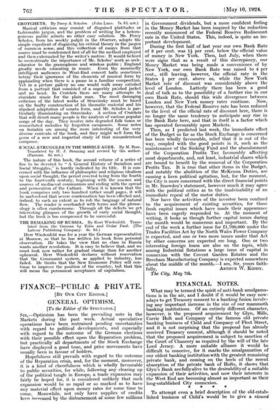FINANCE-PUBLIC & PRIVATE.
[BY OUR CITY EDITOR.] GENERAL OPTIMISM. [To the Editor of the SPECTATOR.] Sni,—Optimism has been the prevailing note in the Markets during the past week. Actual speculative operations have been restrained pending uncertainties with regard to political developments, and especially with regard to the outcome of the German elections with their possible effect upon the Reparation problem, but practically all departments of the Stock Exchange have displayed a good tone, and price movements have usually been in favour of holders. Hopefulness still prevails with regard to the outcome of the Reparation crisis, and, for the moment, moreover, it is a kind of cheerfulness which is wholly favourable to public securities, for while-, following any clearing up of the political tangle in Europe, a trade expansion may fairly be hoped for, it is considered unlikely that such expansion. would be so rapid or so marked as to have any material effect upon money rates for some time to come. Meanwhile, not only have supplies of credits been increased by the -disbursement of some few millions in Government dividends, but a more confident feeling in the Money Market has been inspired by the reduction recently announced of the Federal Reserve Rediscount rate in the United States. This, indeed, is quite an im- portant development.
During the first half of last year our own Bank Rate of 8 per cent. was 1/ per cent. below the official value of money in New York. Then, last July, when there were signs that as a result of this discrepancy, our Money Market was being made a convenience of by New York, our own Bank Rate was raised to 4 per cent., still leaving, however, the official rate in the States / per cent. above us, while the New York Market rate of discount was -considerably above the level of London. Latterly there has been a good deal of talk as to the possibility of a further rise in our own Bank Rate, should this wide divergence between London and New York money rates continue. Now, however, that the Federal Reserve rate has been reduced to the level of the official rate of discount here, there is no longer the same tendency to anticipate any rise in the Bank Rate here, and that in itself is a factor which has operated favourably upon Markets.
Then, as I predicted last week, the immediate effect of the Budget so far as the Stock Exchange is concerned has been wholly favourable, relief that it is out of the way, coupled with the good points in it, such as the maintenance of the Sinking Fund and the abandonment of the Corporation Profits Tax favourably affecting most departments, and, not least, industrial shares which are bound to benefit by the removal of the Corporation Profits Tax. It is true that other items in the Budget, and notably the abolition of the McKenna Duties, are causing a keen political agitation, but, for the moment, the City is more concerned with the direct financial points in Mr. Snowden's statement, however much it may agree with the political critics as to the inadvisability of an immediate repeal of the motor duties. Nor have the activities of the investor been confined to the acquirement of existing securities; for those fresh capital issues which have made their appearance have been eagerly responded to. At the moment of writing, it looks as though further capital issues during the month would be numerous and important. By the end of the week a further issue for £1,700,000 under the Trades Facilities Act by the North Wales Power. Company is expected, and one or two more issues under that Act by other concerns are expected ere long. One or two interesting foreign loans are also on the lapis, while among Industrial flotations a large issue of capital in connexion with the Covent Garden Estates and the Beecham Manufacturing Company is expected somewhere about the middle of the month.—I am, Sir, yours faith-






































 Previous page
Previous page